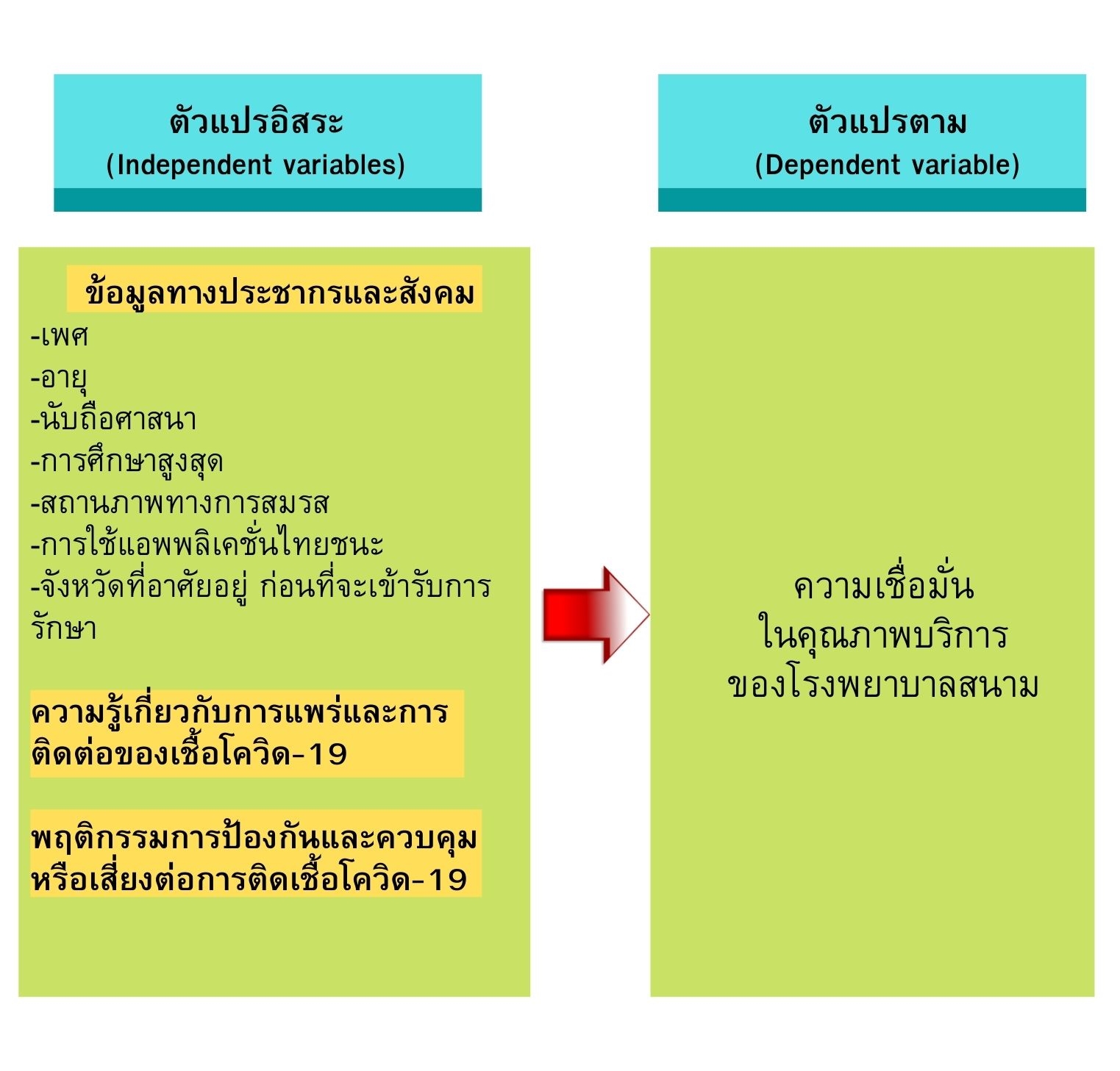ปัจจัยที่มีความสัมพันธ์กับความเชื่อมั่นในคุณภาพบริการภายใต้มาตรการป้องกันและควบคุมเชื้อโควิด-19 ของโรงพยาบาลสนามในพื้นที่จังหวัดตรัง
คำสำคัญ:
ความเชื่อมั่น, คุณภาพบริการ, โควิด-19, โรงพยาบาลสนามบทคัดย่อ
การศึกษานี้มีวัตถุประสงค์เพื่อศึกษาความรู้เกี่ยวกับระบาดของเชื้อโควิด-19 พฤติกรรมการป้องกันตนเอง ความเชื่อมั่นในคุณภาพบริการ และปัจจัยที่มีความสัมพันธ์กับความเชื่อมั่นของผู้ป่วยในคุณภาพบริการของโรงพยาบาลสนาม เป็นการศึกษาแบบภาคตัดขวาง ในผู้ติดเชื้อโควิด-19 ในโรงพยาบาลสนามในพื้นที่จังหวัดตรัง จำนวน 387 ราย ระหว่างเดือน มิถุนายน - กรกฎาคม 2564 โดยตอบแบบสอบถามด้วยตนเองในรูปแบบฉบับพิมพ์หรือลิ้งค์แบบสอบถาม ใช้การวิเคราะห์ถดถอยโลจิสติคแบบไบนารี่ในการศึกษาความสัมพันธ์ ผลการศึกษา พบว่า ผู้ป่วยมีความรู้เกี่ยวกับการระบาดของเชื้อ ระดับดี ร้อยละ 56.3 มีพฤติกรรมป้องกันและควบคุมการแพร่เชื้อ ระดับดี ร้อยละ 57.4 เชื่อมั่นสูงต่อคุณภาพบริการของโรงพยาบาลสนาม ร้อยละ 53.0 โดยภูมิลำเนาและพฤติกรรมการป้องกันตนเอง มีความสัมพันธ์กับความเชื่อมั่นต่อคุณภาพบริการของโรงพยาบาลสนาม อย่างมีนัยสำคัญทางสถิติ (p-value < 0.05) โดยผู้ที่อาศัยอยู่ในจังหวัดตรัง มีความเชื่อมั่นต่อคุณภาพบริการของโรงพยาบาลสนาม มากกว่าผู้ติดเชื้อที่มาจากจังหวัดอื่นๆ 1.7 เท่า (aOR 1.755, 95% CI 1.045 - 2.947) และ ผู้ติดเชื้อที่มีพฤติกรรมการป้องกันตนเองของผู้ติดเชื้อและควบคุมการระบาดของติดเชื้อโควิด-19 อยู่ในระดับ ปานกลาง มีความเชื่อมั่นต่อคุณภาพบริการของโรงพยาบาลสนาม 1.6 เท่า (aOR = 1.575, 95% CI = 1.047 - 2.370) เมื่อเทียบกับผู้ติดเชื้อมีพฤติกรรมการป้องกันตนเองในระดับดี
เอกสารอ้างอิง
Azlan, A. A., Hamzah, M. R., Sern, T. J., Ayub, S. H., & Mohamad, E. (2020). Public knowledge, attitudes and practices towards COVID-19: A cross-sectional study in Malaysia. PLoS One, 15(5), e0233668.
Bendel, R. B., & Afifi, A. A. (1977). Comparison of stopping rules in forward “stepwise” regression. Journal of the American Statistical association, 72(357), 46-53.
Bloom, B. S. (1968). Learning for Mastery. Instruction and Curriculum. Regional Education Laboratory for the Carolinas and Virginia, Topical Papers and Reprints, Number 1. Evaluation comment, 1(2), n2.
Buchheim, L., Dovern, J., Krolage, C., & Link, S. (2020). Firm-level Expectations and Behavior in Response to the COVID-19 Crisis.
Catching, A., Capponi, S., Te Yeh, M., Bianco, S., & Andino, R. (2021). Examining face-mask usage as an effective strategy to control COVID-19 spread. MedRxiv, 2020.2008. 2012.20173047.
Chan, A. K., Nickson, C. P., Rudolph, J. W., Lee, A., & Joynt, G. M. (2020). Social media for rapid knowledge dissemination: early experience from the COVIDâ€19 pandemic. In (Vol. 75, pp. 1579-1582): Wiley Online Library.
Cochran, W. G. (2007). Sampling techniques: John Wiley & Sons.
Eikenberry, S. E., Mancuso, M., Iboi, E., Phan, T., Eikenberry, K., Kuang, Y., . . . Gumel, A. B. (2020). To mask or not to mask: Modeling the potential for face mask use by the general public to curtail the COVID-19 pandemic. Infectious Disease Modelling, 5, 293-308. doi:https://doi.org/10.1016/j.idm.2020.04.001
Hill, P. L., Klaiber, P., Burrow, A. L., DeLongis, A., & Sin, N. L. (2020). Great, purposeful expectations: predicting daily purposefulness during the COVID-19 response. The Journal of Positive Psychology, 1-13.
Huynh, G., Nguyen, T. N. H., Vo, K. N., & Pham, L. A. (2020). Knowledge and attitude toward COVID-19 among healthcare workers at District 2 Hospital, Ho Chi Minh City. Asian Pacific Journal of Tropical Medicine, 13(6), 260.
Intawong, K., Olson, D., & Chariyalertsak, S. (2021). Application technology to fight the COVID-19 pandemic: Lessons learned in Thailand. Biochemical and Biophysical Research Communications, 534, 830-836. doi:https://doi.org/10.1016/j.bbrc.2020.10.097
Jiang, Y., Yao, Y., Zhu, X., & Wang, S. (2021). The Influence of College Students' Empathy on Prosocial Behavior in the COVID-19 Pandemic: The Mediating Role of Social Responsibility. Frontiers in Psychiatry, 12.
Liu, X.-J., & Mesch, G. S. (2020). The adoption of preventive behaviors during the COVID-19 pandemic in China and Israel. International journal of environmental research and public health, 17(19), 7170.
Singkun, A. (2021). Factors associated with social responsibility among university students in Yala, Thailand during the COVID-19 pandemic. Journal of Health Research, 35(3), 265-275. doi:10.1108/JHR-05-2020-0142
Singkun, A., Patiwikriwong, P., Chainapong, K., & Weerakhachon, P. (2020). Factors Associated with Coronavirus 2019 (COVID-19) Prevention Behaviors among Health Sciences Students of a Higher Education Institution in Yala Province, Thailand. Walailak Journal of Science and Technology (WJST), 17(9), 967-978. doi:10.48048/wjst.2020.10022
Singkun, A., Payodeuramae, F., Samae, N., Patiwikriwong, P., Chainapong, K., & Weerakhachon, P. (2020). Social Responsibility Behaviors among Universities Students in the 3 Southern Border Provinces of Thailand in the Period of Corona Virus 2019 (COVID-19) Pandemic. Walailak Journal of Science and Technology (WJST), 17(9), 979-989. doi:10.48048/wjst.2020.10066
Tso, R. V., & Cowling, B. J. (2020). Importance of Face Masks for COVID-19: A Call for Effective Public Education. Clinical Infectious Diseases, 71(16), 2195-2198. doi:10.1093/cid/ciaa593
Worby, C. J., & Chang, H.-H. (2020). Face mask use in the general population and optimal resource allocation during the COVID-19 pandemic. Nature communications, 11(1), 1-9.
World Health Organization Thailand. (2020). Coronavirus disease 2019 (COVID-19).
Zhou, F., Yu, T., Du, R., Fan, G., Liu, Y., Liu, Z., . . . Gu, X. (2020). Clinical course and risk factors for mortality of adult inpatients with COVID-19 in Wuhan, China: a retrospective cohort study. The lancet, 395(10229), 1054-1062.

ดาวน์โหลด
เผยแพร่แล้ว
รูปแบบการอ้างอิง
ฉบับ
ประเภทบทความ
สัญญาอนุญาต
ลิขสิทธิ์ (c) 2022 วารสารสาธารณสุขและวิทยาศาสตร์สุขภาพ

อนุญาตภายใต้เงื่อนไข Creative Commons Attribution-NonCommercial-NoDerivatives 4.0 International License.
บทความทุกบทความที่ได้รับการตีพิมพ์ถือเป็นลิขสิทธิ์ของ วารสารสาธารณสุข















